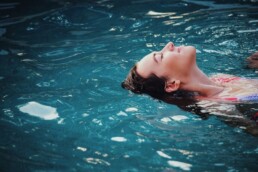Stay safe while making a splash: Essential swimming safety tips
Summer arrived: Swimming Safety tips
Swimming is a fantastic way to cool down on a hot summer day, get some exercise, and have fun with friends and family. But whether you’re diving into a refreshing pool or enjoying the natural beauty of a lake, it’s crucial to prioritize swimming safety. Here, we’ll explore essential safety tips to ensure a healthy and enjoyable swimming experience.
Freshwater fun with safety first
If you prefer the natural environment of lakes or rivers, always check the local water quality reports before taking a dip. Contaminated water can harbor harmful bacteria, viruses, and parasites that can cause illness.
Beware of algal blooms
Those vibrant green patches on the water’s surface – algal blooms – might look inviting, but they’re best avoided. These blooms can harbor toxins that can irritate your skin, eyes, or even cause respiratory problems.
Minimize water swallowing
It happens – a splash in the face, a playful dunk – but try to avoid swallowing pool or freshwater while swimming. Accidental ingestion can introduce harmful microorganisms into your body.
Shower before and after the take a dip
Taking a quick shower before entering the pool or lake removes sweat, dirt, and lotions that can contaminate the water. Showering again after swimming washes away any residual chlorine or bacteria on your skin.
Dry thoroughly, especially your ears
Don’t forget to dry off completely after swimming, paying particular attention to your ears. Moisture trapped in the ear canal can create a breeding ground for infections like swimmer’s ear.
Fresh clothes after the fun
Avoid lounging around in wet clothes after swimming. Put on dry clothes to prevent skin irritation and potential infections from lingering moisture.
Open wounds and swimming don’t mix
If you have any open cuts or wounds, it’s best to avoid swimming. Open wounds can become infected more easily in water.
Diarrhea? Stay out of the water
Recently had diarrhea? Hold off on swimming for at least two weeks. This simple step helps prevent spreading the illness to others who might share the water.
Maintaining pool hygiene for everyone’s safety
Public pools offer a refreshing escape, but it’s important to be aware of pool hygiene practices. Proper chlorine levels are essential for effective water disinfection. Additionally, pool operators should take steps to minimize bacterial and urine contamination.

Chlorine and your health
Chlorine is the primary disinfectant used in pool water. While it’s effective in killing many germs, it’s not foolproof. High water temperatures or heavy pool use can affect chlorine’s effectiveness.
The red-eye myth
Red, irritated eyes after swimming? It’s not always the chlorine’s fault! The culprit might be a combination of chlorine reacting with sweat and urine residues in the water.
Beyond urine: fecal contamination matters
Traces of fecal matter pose a more significant health risk than urine. Maintaining proper pool hygiene and encouraging good swimming etiquette are crucial in preventing fecal contamination.
Simple tips for a healthy pool experience
- Shower before swimming: Showering removes sweat, urine traces, and other contaminants before entering the pool.
- No peeing in the pool: This may seem obvious, but it’s an important reminder, especially for children.
- Be mindful and respectful: Avoid contaminating the water and becoming infected yourself. Don’t swim if you’re sick, and take frequent bathroom breaks for children.
- Avoid water jets: Refrain from sitting or playing directly in water jets to minimize exposure to potential contaminants.
By following these swimming safety tips and promoting good pool hygiene practices, you can ensure a healthy and enjoyable experience for yourself and others.

Safe swimming for kids: A splash of fun with peace of mind
Swimming is a fantastic activity for kids, offering exercise, fun, and a chance to cool off on hot days. But ensuring their safety is paramount. Here are some key points to remember:
- Always supervise children closely around water. Never leave them unattended, even in shallow areas.
- Teach them basic water safety skills. Enroll them in swimming lessons if possible.
- Emphasize the importance of not swallowing pool water or lake water.
- Instruct them to use the bathroom before entering the pool.
- Remind them not to run around the pool or engage in rough play.
Remember: Safety is always the top priority when enjoying a refreshing swim.
Published by: Lovitall.pt – Health related events organizer
